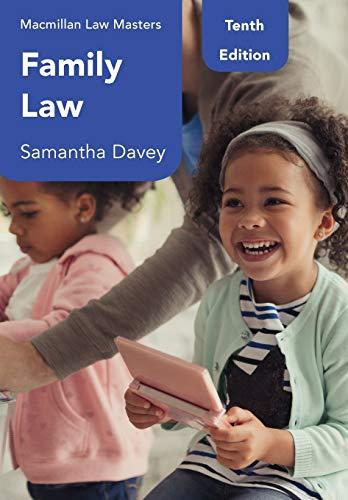Question
1) Which of the following is the most usable definition of law? A) It is most useful to us to define law in terms of
1) Which of the following is the most usable definition of law?
A) It is most useful to us to define law in terms of what we think people ought to do.
B) It is most useful to us to define law in terms of what people do.
C) We must define law in terms of what the courts or other government bodies will enforce.
D) We must define law in terms of what society needs people to do.
E) We must define law in terms of what people used to do.
2) Which of the following is an advantage of using alternative dispute resolution (ADR)?
A) Lengthy process
B) Sets a binding precedent
C) More expensive than litigation
D) Ensures full disclosure
E) Speedy resolution
3) Which of the following is false with regard to our legal system?
A) An appeal from the Supreme Court of Canada goes to the Federal Court of Appeal.
B) Our Charter of Rights and Freedoms diminishes the power of both the federal and provincial legislatures.
C) Our constitution can be amended but not by the federal parliament acting alone.
D) If a case were heard before a provincial trial level court, the judge could apply both legal and equitable principles and award both legal and equitable remedies.
E) Although a statute overrides the case law on the same point, subsequent cases may affect the statute by interpreting its meaning.
4) Which of the following is essential for a work to have copyright protection?
A) The idea on which the work is based must be original.
B) The subject matter of the work must only fall into either musical or artistic categories.
C) The expression of the idea must be an original product of the author's own skill.
D) The expression of the idea will generally be sufficient.
E) The creator of the work must register his/her work in Canada.
5) In Harvard College v. Canada (Commissioner of Patents), Harvard College sought protection for a genetically altered mouse. What was the result given the decision of the Supreme Court of Canada?
A) Unless the Patent Act is amended, higher life forms can only be patented under the doctrine of "sound prediction."
B) The oncomouse was granted patent protection on the basis that it was not the product of the laws of nature.
C) The oncomouse was granted patent protection on the basis that it was the product of inventiveness.
D) The oncomouse was granted patent protection on the basis that it was a non-naturally occurring composition of matter.
E) Unless the Patent Act is amended, higher life forms cannot be patented in Canada.
6) An ad in the morning paper read: "Brand new Spartan 6s smartphone $349. No payment until January. We make your first payment." This is an example of which of the following?
A) Invitation to treat
B) Offer
C) Gratuitous promise
D) Bilateral contract
E) Unilateral contract
7) In which of the following situations would an infant be bound by the contract he has entered into?
A) A contract for the purchase of a bike with which to race.
B) A government student loan.
C) A contract for the purchase of a new leather jacket, where the merchant was not aware that he had several other jackets at home.
D) A contract for the purchase of theatre tickets.
E) A written contract for the purchase of a new stereo.
8) Which of the following is false with regard to contract law?
A) A counter-offer ends an offer.
B) A newspaper notice offering to pay a reward for the return of lost kittens is an invitation to treat.
C) An important criterion for determining the place of the contract is the place where the acceptance is effective.
D) An option is a contract in which one person is buying a period of time within which he may accept the offer contained within the option.
E) A revocation is effective only when received.
9) A computer salesman innocently misrepresented a fact about a StarSystem computer to a customer. Although this fact was not about a term of the contract, it did induce the customer to buy the computer. The customer has now learned the true facts and wants to return the computer. If the store refuses to take it back, the customer would ask the court for which equitable remedy?
A) Damages
B) Rescission
C) Rectification
D) Restitution
E) Injunction
10) A requirement of the rules of ________ is that the decision be made by the persons hearing the evidence.
A) fundamental justice
B) procedural fairness
C) procedural justice
D) natural justice
E) ADR
Step by Step Solution
There are 3 Steps involved in it
Step: 1

Get Instant Access to Expert-Tailored Solutions
See step-by-step solutions with expert insights and AI powered tools for academic success
Step: 2

Step: 3

Ace Your Homework with AI
Get the answers you need in no time with our AI-driven, step-by-step assistance
Get Started


